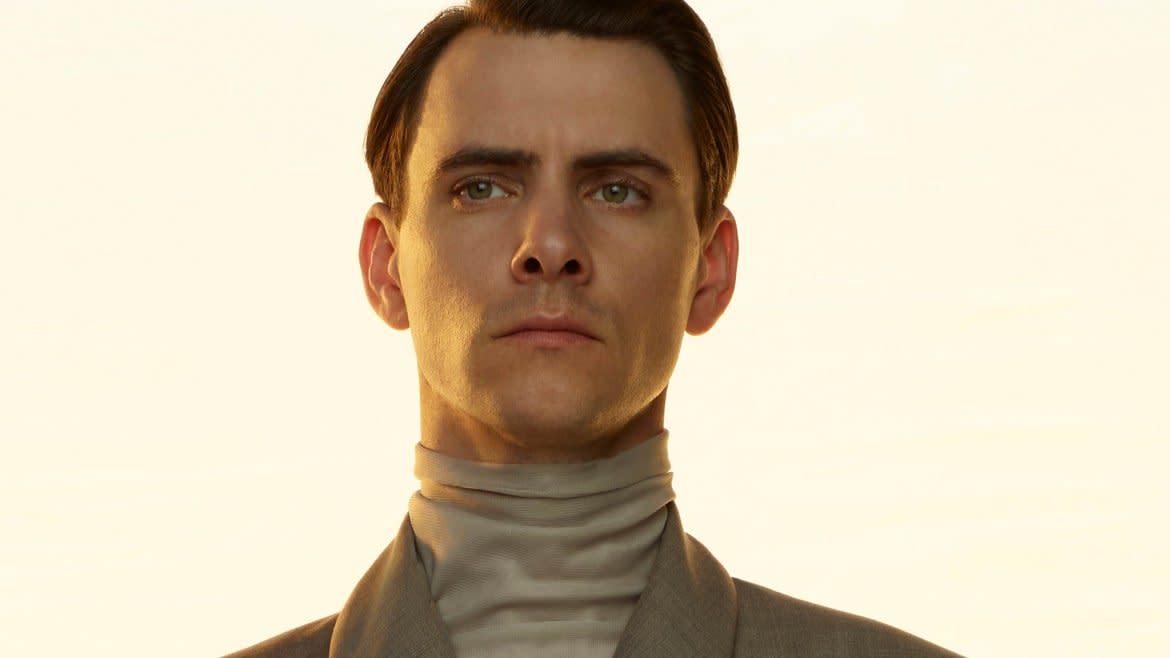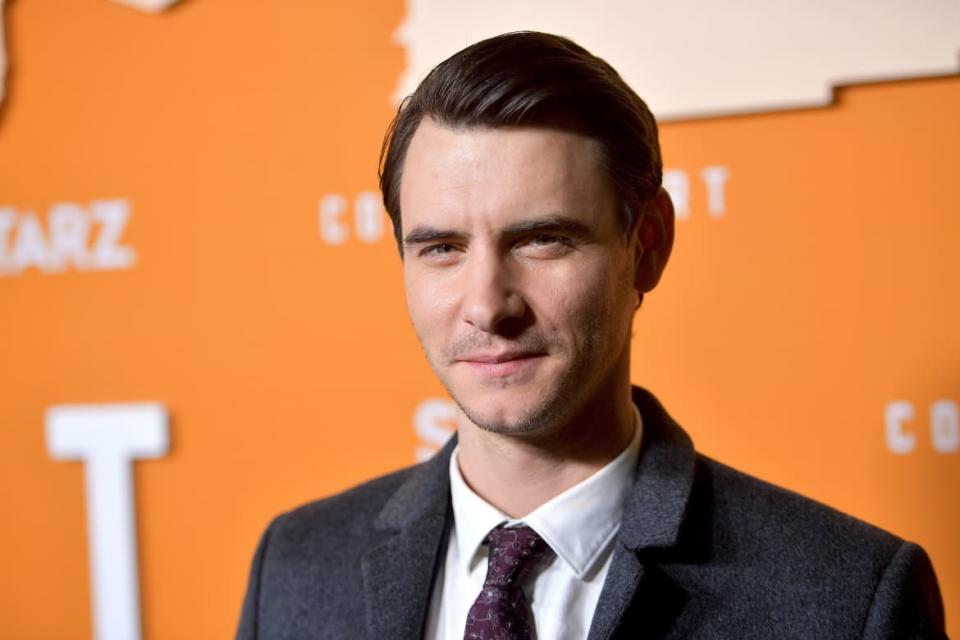Harry Lloyd: From Game of Thrones’ Most Epic Death to a ‘Brave New World’

In many ways, the horrible wig was the best thing to happen to Harry Lloyd.
The shock of platinum blonde hair, slashed to a sensible bob at his shoulders like a high-fashion Legolas, was the coif that tied Lloyd’s indelible, insufferable Game of Thrones character together: Viserys Targaryen, the petulant narcissist whose play for the Iron Throne melts along with the rest of him under a pot of molten metal poured over his head, one of the show’s first and most iconic gruesome death scenes.
The splashy HBO production was the biggest job the young actor had ever landed, and as a character with an unmistakable, unforgettable look, to boot— the better to sear into TV fans’ consciousness.
Blessedly, that unmistakable, unforgettable look in no way actually resembled him, a then-27-year-old rising star with short, dark brown hair and alabaster complexion. He played one of the most memorable characters in recent TV history on possibly the last truly massive global TV phenomenon, yet, by the grace of a wig, he was still unrecognizable.
“I kind of loved that,” Lloyd tells The Daily Beast over Zoom from the loft study in his North London home. “And I kind of loved that he died. He had this lovely arc, and he still has his place in this enormous and infamous canon.”
Given how vivid that arc is in Thrones lore, it’s almost startling to remember that he was only on five episodes of the show.
“I had my go,” he says. “I got in early and I got out early. And he didn’t look like me, which, number one, is good because he is a little shit. And so I was happy to not have people throwing stuff at me in the streets. But number two, and I didn’t notice at the time, but it has since become the biggest show on TV. It doesn’t make me worry about being typecast so much.”
Naya Rivera Was the Best Part of ‘Glee’
‘The Old Guard’ Finally Gives Us Gay Superheroes—And It’s More Beautiful Than We Hoped
In the years since becoming a scalded puddle of boiling jewels and flesh, Lloyd has been able to shapeshift through an impressive résumé of prestige TV series and award-nominated films—Manhattan, Wolf Hall, Counterpart, Legion, The Theory of Everything—relieved of the kind of limitations actors who play little shits in garish white wigs on TV’s biggest show typically shoulder.
The occasion for our conversation is yet another transformation, as Bernard Marx in Brave New World, the splashy adaptation of Aldous Huxley’s 1932 dystopian sci-fi novel. The series is the marquee original offering for Wednesday’s launch of the new Peacock streaming service, casting Downton Abbey alum Jessica Brown Findlay and Han Solo himself, Alden Ehrenreich, alongside Lloyd in an updated take on the classic work.
Brave New World thwarts the idea of a restrictive, Orwellian dystopia with one in which society is instead forced into surrendering their inhibitions. “Welcome to New London,” a prologue explains. “We have three rules. No privacy. No family. No monogamy. Everyone is very happy.”
The new series boasts modernized flourishes when it comes to style—if there had been this much sex in Huxley’s book, we would have paid far more attention to it in high school—and sensibility; some of the problematically racist and misogynistic themes and plot points have been corrected.
Lloyd’s Bernard is an upper echelon member of society, called an Alpha-Plus, whose job is to maintain social order. Throughout the series, he experiences a crisis of conscience, an existential awakening at odds with the blissful stasis he’s meant to both control and enjoy.
If a narrow escape from typecasting and a career playing snooty, megalomaniacal manchildren has meant a diverse array of opportunity for Lloyd, then Brave New World marks more new territory: It’s his first outright leading role.
Lloyd had never read Huxley’s book before being cast, but was impressed by the ambition of the script, “almost like a mega tentpole movie in scale” but esoteric and satirical at the same time. “I was like, this has the whole package if they can shoot this, but I don’t think they can.”
It took one day on set for him to catch wise to the technical prowess at play. “I was like, wow, this really is a brave new world,” he says.
Don’t worry. He promptly scoffed at himself and rolled his eyes.
It is one of the best opening lines to a profile that I’ve read, from a 2011 feature on Lloyd that ran in Britain’s The Independent: “There was a time when Harry Lloyd worried that he was forever going to be typecast—as a woman.”
It was in reference to Lloyd’s days as a student at Eton College, where the young teen’s voice had not yet broken and he was cast as women in a slew of all-male Shakespeare productions.
Here we were prepping to engage with Lloyd about the perils of typecasting following his Thrones stint, ignorant of the fact that he had already confronted the issue decades earlier.
Lloyd laughs good-naturedly when the era of fake bras and bonnets is brought up.
“I hated it,” he says. Just when he had vowed never to agree to it again, in his last year at school he was asked to play Rosalind in As You Like It, by all counts a fantastic leading part. He nailed it, and earned raves. “At an all-boys boarding school, it took balls to put on tights, as it was.” A perfectly-earned smirk at his own joke follows.
The truth is that being typecast or pigeon-holed is a stressor that followed Lloyd, who grew up in London with parents who worked in the book industry. “Sometimes it’s just the face you have at a certain age…” he says.
His first major role came at age 15 in the BBC’s 1999 adaptation of David Copperfield, opposite Daniel Radcliffe. (Adding another fascinating layer to the trivia: Lloyd himself is the great-great-great grandson of Charles Dickens.) One of his first jobs after that was playing a bullying prefect in the series Goodbye, Mr. Chips.
“I guess that’s what I looked like, and I did that a couple of times,” he says. “Then I was like, I don’t really want to just be that guy. He’s a bit of a dick. And then I think next up I played the murderer in some procedural police thing, some young kid that’s gone sideways.”
Each time he felt a box starting to close its sides around him, he actively sought out something different. Having Great Expectations, in which he played Herbert Pocket, “the loveliest, most benign chap you’d ever meet,” air months after his Thrones debut was key. But he can’t refute that, with or without a platinum wig, there’s something about the way he looks that telegraphs a certain kind of sinister character.
“If I turn up in a murder thing, it’s often me who’s done it,” he says, grinning. “I don’t want to give anything away from the stuff I’ve been in. But I don’t know, there’s something about my face that is like, ‘He could do it.’”
After he had finished filming his part on Thrones and the series was about to come out, he was cast in the buzzy West End production of the Tony-winning play The Little Dog Laughed.
If you’re familiar with the work, a satire about Hollywood illusion (and delusion) in which an acerbic, big-wig agent crisis manages her rising-star client’s pesky “recurring case of homosexuality,” you understand why it’s a fairly hilarious, if sobering, project to be involved in just as an actor’s own fame and industry profile is about to skyrocket.
“Because I was about to be on Game of Thrones, I thought, this is the time for me to get an American agent,” he recalls. “And so the American agents, when they were in London, would come and see me in this play, which basically looks at agenting and their ways with quite a big, angry magnifying glass. They would come backstage and say, ‘Look, I am not like that…’” He laughs. “It was always quite a funny way to start the proceedings.”
Having starred in episodes of Dr. Who and played Charles Xavier in Legion, not to mention his connection to Thrones, Lloyd has had his taste of the particular brand of rabid, Comic-Con fandom. Though he prefers to classify himself as “adjacent-adjacent” to that world.
While there are certainly those who will know right away that he was a Targaryen, what he gets more of is a “Wait, how do I know you?” awkward conversation. “Genuinely, people are like, ‘Hey, did I go to school with you?’ I’m at that level of renown. You can’t quite place why you might recognize me.”
Asked how life under the coronavirus shutdown has been, Lloyd is very British about the months spent with his wife and their almost-2-year-old. “We’ve done alright,” he says. “We learned how to finally kind of plan our fridge. And now we know how to do our shopping tactically. We cooked some good stuff.”
For fear of sounding “solipsistic,” to use a word employed often in Brave New World, he identifies the extended time home with typical feelings actors have throughout their career.
“You have accelerated times in your life when things happen like a dream,” he says. “Things are so fast and our whole world’s rebuilt entirely every time you get a job. And then is the come-down and the fallout.”
He remembers that feeling from when he was doing plays: the energy and pace of putting on the show, and then a few weeks after it ends there’s a massive crash.
“It feels a bit like you’re in lockdown. You stare around on a Tuesday afternoon. You don’t want to watch anything. You don’t know what to do or who to call, and you kind of lose your style. There’s been a bit of that.”

Harry Lloyd
Just when things got to the point that he felt like he might lose his mind, he was contracted to record an audiobook. So for a couple of days a week, he would sit up in his “sweatbox made out of duvets” and read Great Expectations aloud for Penguin. “That saved me for sure.”
On the subject of works by his great-great-great grandfather, Lloyd used to be at a loss for what to do when people brought it up. Often they would say, “Congratulations!” on the relation, as if he had accomplished something himself by being born into Charles Dickens’ lineage. “But these days, I’ll take it, I’ve decided. ‘Yeah, thank you so much.’ It’s a nice thing to celebrate.”
The 150th anniversary of Dickens’ death was in June. There had been plans for a commemoration ceremony at Westminster Abbey that, because of the shutdown, became a Zoom event instead.
“I don’t know how many people’s deaths get a 150th anniversary,” he says. “The fact that I have any kind of personal connection with that is very much secondary. But something that I’m very proud of.”
At risk of belaboring the point, we ask if working on any of the Dickens adaptations he’s starred in on TV or recording this audiobook makes Lloyd feel any sort of profound or poignant connection to him.
He laughs. “I can’t point to a physical sensation like hairs in the back of my neck standing. ‘I feel him. It’s me and Chucky D in the room right now.’”
Got a tip? Send it to The Daily Beast here
Get our top stories in your inbox every day. Sign up now!
Daily Beast Membership: Beast Inside goes deeper on the stories that matter to you. Learn more.

 Yahoo News
Yahoo News 
